Reuters, Wednesday June 17 2009
Tag: Istanbul
-
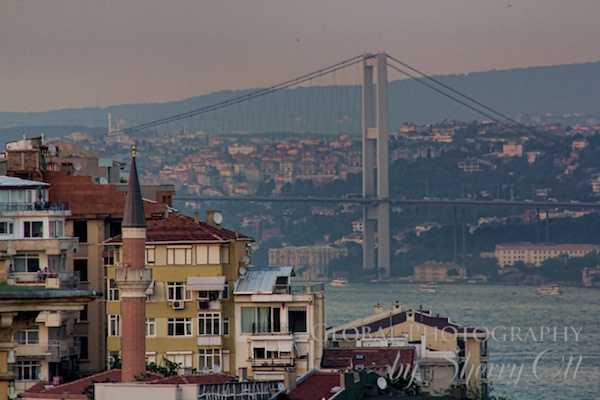
Crisis veteran Turkey among first to recover in 2010
By Alexandra Hudson ISTANBUL, June 17 (Reuters) – Turkey, a financial crises veteran, could be the first in emerging Europe to return to stable growth next year thanks to its robust banking system, lack of export dependency and enviable demographics. The global downturn has brought considerable pain to Turkey’s once fast-growing economy if not the high drama seen elsewhere — unemployment hit record levels, industrial production and capacity utilisation plummeted, and the lira is trading at levels last seen for a sustained period in 2003.But as some indicators begin to post faint gains many analysts forecast Turkey, dubbed “China on the Bosphorus” by one, could see the strongest growth of the ailing Emerging Europe region in 2010, with forecasts for economic growth next year as high as 3.0 percent.“We expect the economy to rebound faster than anyone else in emerging Europe,” said economist Manik Narain at Standard Chartered Bank, who sees 5 percent GDP decline in Turkey this year turning into growth of 1.5 percent next year.“Turkey is much less reliant on exports than peers,” said Narain, and while Turkey does depend on foreign capital inflow — often cited as a negative — credit markets are thawing.By contrast many banks in Eastern Europe are dependent on cash-strapped Western European parent institutions for funding, and are without the strong deposit base held by Turkish banks.While 2010 looks brighter Turkey must first weather this year’s contraction — forecast by the government at 3.6 percent and the IMF at 5.1 percent. Markets are braced for first-quarter gross domestic product figures on June 30 showing double-digit contraction.Such a fall would outstrip Turkey’s worst quarterly economic performance from the trough of the 2001 domestic crisis.But lessons learned in that crisis which wiped out several banks, have left Turkey’s banks well capitalised and stable. As credit markets thaw Turkish lenders are well placed to resume borrowing and lending activities to help spur domestic demand in the country of 72 million.“You can only grow domestically when you have the credit for it. Turkey has the combination of a banking system less damaged by the crisis and a large market,” said economist Christian Keller of Barclays Capital, who sees 2010 growth at 3 percent.Ratings agency Fitch forecasts Turkey will grow 2.5 percent next year, the highest growth of the region after Azerbaijan and topping a projected 2 percent rise in Russia.It ascribes this to Turkey’s relative lack of dependence on trade — the value of merchandise exports accounted for only 16 percent of Turkish GDP in 2007, compared with 78 percent for Slovakia, 27 percent for Russia and 33 percent for Poland.Turkey also lacks the huge dependence on commodity exports of countries such as Russia.Economist Neil Shearing of Capital Economics agrees Turkey could be among the fastest to emerge from the region, although he believes Poland could just beat Turkey as its fiscal position is stronger.“Turkey doesn’t have any of the obvious distortions in the banking sector such as the likes of Latvia, Romania, Hungary and Ukraine have seen,” he said.Turkey’s central bank has been able to act more aggressively in easing monetary policy and these rate cuts have been passed on more effectively than elsewhere, he said.Interest rates have fallen by a massive 800 basis points since last November. For related story click here [ID:nLG854256]But he cautions Turkey is heavily reliant on cyclical industries such as car manufacturing, which have been hard hit during the crisis, even though the government has just extended sales tax cuts to try and support the domestic auto industry.SPENDTHRIFT GOVERNMENTOptimism over Turkey’s outlook for next year is tempered by concern that Turkey is still without a new loan deal from the IMF, which could ease borrowing requirements, and fears Prime Minister Tayyip Erdogan’s big-spending government looks to have thrown fiscal caution to the wind.Even the central bank is urging the government to take care.In the first five months of 2009 the budget deficit surged to 20.683 billion lira from 2.060 billion a year earlier. The government has also revised its full-year budget deficit target to 48.3 billion lira from 10.4 billion lira.“Turkey can probably get away without an IMF programme but I think it would be fairly unwise to do so. It needs to persuade the market that it is fiscally prudent and the best way to do that is to sign up with a new IMF deal and ensure fiscal retrenchment,” said Shearing.After months of discussions and footdragging a new deal with the IMF is starting to look in doubt, particularly as talks are now mired in arguments about government spending.“Without an IMF programme the issuance need by the government could crowd out the private sector. 2010, when things should be getting better, might be exactly the time when high amounts of bonds will crowd out the private sector and drive up rates,” said Keller.“However, with an IMF deal we could have a surprise in growth on the upside.”Before the crisis struck, aspiring European Union member Turkey had grown an average of 6 percent each year over the past six years, overcoming domestic political strife to lure huge amounts of foreign direct investment.Any growth below such levels will still feel tough in a country with huge youth unemployment and a large grey economy.“Whatever happens the recovery in Turkey will be fairly tame, even if it is the first out,” said Shearing. (Editing by Toby Chopra)Guardian -

Greek carrier Aegean to start flights to Turkey
 17 Jun 2009
17 Jun 2009ATHENS, June 17 (Reuters) – Greek carrier Aegean Airlines (AGNr.AT) said on Wednesday it will start a daily service to Istanbul, Turkey from Sept. 9, expanding its international routes.
Aegean, Greece’s largest airline by passenger numbers in 2008, competes with recently privatised Olympic Airlines.
The airline has been steadily expanding its routes outside Greece, adding seven destinations since late 2008, including Brussels, Berlin, Barcelona, Venice and Paphos in Cyprus.
It will fly Airbus A320 aircraft on the Istanbul route.
“After five years of efforts Aegean can now link Athens with a city symbolising so much for Hellenism,” chief executive Dimitris Gerogiannis said in a statement.
Last month, Aegean clinched a deal to join Star Alliance, which includes UAL Corp’s United (UAUA.O), German Lufthansa (LHAG.DE), Air Canada ACa.TO., and Continental (CAL.N), eyeing access to many markets across the globe with large communities of Greek descendants. (Reporting by George Georgiopoulos; Editing by Dan Lalor)
Reuters
-
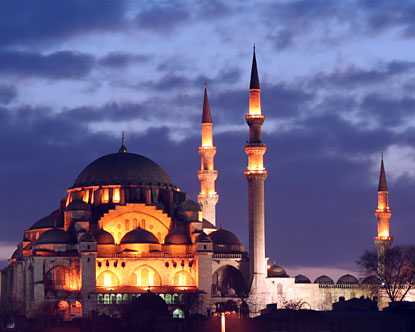
World Water Forum: The world’s largest water event
İstanbul The World Water Forum is the main water-related event in the world, aimed at putting water firmly on the international agenda. A stepping stone towards global collaboration on water problems, the Forum offers the water community and policy-and-decision-makers from all over the world the unique opportunity to come together to create links, debate and attempts to find solutions to achieve water security. It is organised every three year by the World Water Council, in collaboration with the host country.
The 5th World Water Forum will be held in Istanbul, Turkey, from 16 to 22 March 2009.About the World Water Forum
The World Water Forum, organized every three years by the World Water Council in close collaboration with the authorities of the hosting country, is the largest international event in the field of water. It primarily serves four main purposes:
- To raise the importance of water on the political agenda
- To support the deepening of discussions towards the solution of international water issues in the 21st century
- To formulate concrete proposals and bring their importance to the world’s attention
- To generate political commitment
The successive editions of the World Water Forum have served as stepping-stones towards global collaboration on water problems. The Forum offers the water community and decision-makers from all over the world the unique opportunity to make recommendations for ensuring the security of water resources in the different parts of the world.
Background
The 1st World Water Forum was held in Marrakech, Morocco, in 1997. This Forum led to the preparation of a “Vision for Water, Life and the Environment in the 21st Century”, whose results were discussed during the 2nd World Water Forum in 2000 in The Hague, Netherlands. A great number of Governments and organisations from the water sector committed themselves to work towards its concretisation. As a privileged witness of these commitments, the Council has since verified the implementation of promised actions in this direction.
In March 2003, the 3rd World Water Forum in Kyoto, Japan, clearly stated its resolution to involve all stakeholders through, for example, the creation of a “Virtual Water Forum” and the gathering of thousands of testimonies within the “Voices of Water.” The Council, following its commitments made at the 2nd World Water Forum, presented its “World Water Actions” Report: an inventory of 3000 actions on the ground. By gathering more than 24,000 participants, the 3rd World Water Forum was the largest water-related event ever organised. One hundred and thirty ministers attended the Ministerial Conference. Several hundred commitments were made both during the Forum and during the Ministerial Conference. Each session-organiser was also asked to formulate a list of concrete actions to be set up in the near future.
For the 4th edition, the World Water Forum was organised for the first time on the American continent in Mexico City, gathering approximately 20,000 participants.
URGENT NOTICE:
- Local Authorities Meeting which would take place on 18th March Wednesday between 08.30 – 13.00 and 14.30 – 19.00 and on
19th March Thursday 14.30 – 19.00 in Feshane is now moved to LUTFI KIRDAR CONGRESS CENTER (RUMELI HALL)
- “Parliaments for Water Meeting” which would take place on Wednesday, March 18th between 10:00 – 18:45 in Kagıthane Hall,
Sutluce Congress and Cultural Center is now moved to the DOLMABAHCE HALL, CEYLAN INTERCONTINENTAL HOTEL
Source: www.worldwaterforum5.org
-
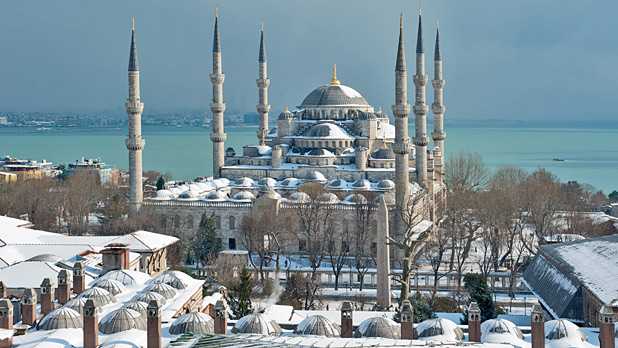
Water Forum in Istanbul
Turkey this year will be hosting the 5th World Water Forum in Istanbul, the largest ever, which will take place at the new Sutluce Conference Center and the Feshane on the Golden Horn. The first World Water Forum was held in Marakesh, Morocco in 1997, followed by the forums in Lahey, Holland, Kyoto, Japan and Mexico, which is repeated in different parts of the world every 3 years. The decision to hold the Forum in Turkey in 2009 was taken last year during a meeting in Izmir on June 27, 2008.
Over 20,000 participants, including over 100 government ministers and more than 20 heads of state are expected to attend the Forum, which is being sponsored by the State Hydraulics Works (DSI), the Ministry of Foreign Affairs, The Ministry of Environment and Forestry, the World Water Council (WWC), the Istanbul Water and Sewarage Administration (ISKI), the Istanbul Metroplitan Municipality (IBB) and the Turkish Airlines.
According to the advance program details, therew will be many exhibitions and the main theme of the Forum will be ‘’Farkliliklarin Suda Yakinlasmasi – Differences to come Close’’ and will consist of six main topics and 23 headings covering all water-related subjects, including the developmet of large dams, some of which are being contested in Turkey. Among the many publications and declarations to be issued during the week long Forum will be ‘’Istanbul Water Concencus’’ to be signed by the Mayors from around the world and a prize, ‘’Turkish Republic Prime Miniser’s Water Prize’’, worth Euro 40,000 will also be awarded this year.
The ‘’water’’ civilisation in Turkey has a long history. Water has been used for irrigation in Anatolia since the early days of agricultural development hundreds of years ago. The first dam, the Karakuyu Sam, was built by the Hittites in 1,240 BC, more than 3,000 years ago, near Corum. One of the earliest dams built in Turkey was the Cubuk Dam near Ankara. Investigations and studies over the Firat (Euphrates) and the Dicle River Basins (Tigris) were started back in 1936 at Ataturk’s orders. This led to the establishment of the State Hydrauics Works in 1954, which is celebrating its 55th anniversary this year
The Southeastern Anatolia Project (GAP)
One of the Forum topics to be discussed is the Southeastern Anatolia Project (GAP) and the government’s plan to complete the mega project which was started in 1978, almost 31 years ago.. One of the first large hydroelectric power plants built in the region was Keban HES between 1966 and 1974. Ebasco Services Inc, now part of the Washington Group in New Jersey, was the consulting firm responsible for the management of the project. Keban was not part of the GAP but many dams and hydoelecric power plants were built afterwards, including the world’s 3rd largest, the Ataturk HES. The advancement at GAP is estimated to be around 50 % When completed in perhaps another ten more years, there will be 19 hydroelectric power plans providing electricity to the Turkish grid and water for irrigantion purposes..
The ground breaking ceremony for another large project, the Ilısu Dam and HES on the Dicle River, under planning and study stage since the 1950s, took place three years ago, but due to many controversial issues, such as the loss of 12,000 year old historic town of Hasankeyf, the financing has not been finalized and therefore the construction has not been started yet, which is expecetd to draw hot discussions during the conference.
Yuksel Oktay, PE
Civil Engineer
-
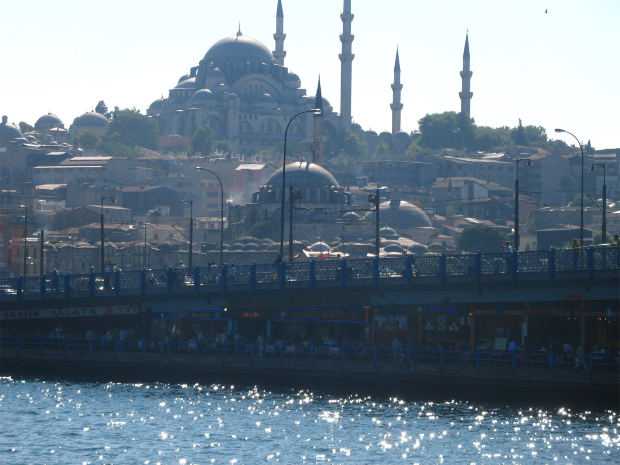
History of Istanbul
What is now called Asian Istanbul was probably inhabited by people as early as 3000 BC. Eventually, in the 7th century, Greek colonists led by King Byzas established the colony of Byzantium, the Greek name for a city on the Bosphorus. Byzas chose the spot after consulting an oracle of Delphi who told him to settle across from the “land of the blind ones.” Indeed, Byzas concluded, earlier settlers must have been deprived of their sight to have overlooked this superb location at the mouth of the Bosphorus strait. This proved an auspicious decision by Byzas, as history has shown Istanbul’s location important far beyond what these early Greek settlers might possibly have conceived. Byzas gave his name to the city: Byzantium.
In the early 100’s BC, it became part of the Roman Empire and in 306 AD, Emperor Constantine the Great made Byzantium capital of the entire Roman Empire. From that point on, the city was known as Constantinople. The mid 400’s AD was a time of enormous upheaval in the empire. Barbarians conquered the western Roman Empire while the Eastern, also called the Byzantine Empire, kept Constantinople as its capital. In 532 during the reign of Justinian I, antigovernment riots destroyed the city. It was rebuilt, and outstanding structures such as Hagia Sophia stand as monuments to the heights Byzantine culture reached.
Read more :
-
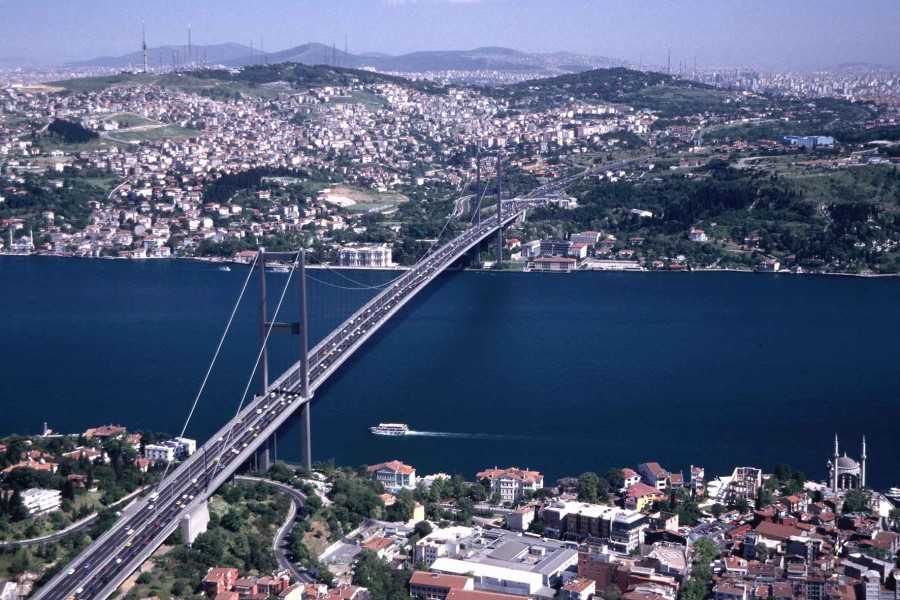
8000 years in 48 hours..1 mad weekend in Istanbul
“Welcome, my friends, welcome to Istanbul!”
These were the first words that I heard as I lugged my overstuffed holdall through Sabiha Gokcen airport (taking full advantage of Easy Jet´s “no weight limit on hand luggage” policy) and was loaded into the waiting minibus that would take us to Istanbul. The third largest city in the world, Istanbul is spread over two continents and as we clung onto our safety belt free seats we gazed out on a thoroughly modern looking Asia (the airport itself is named after the first female combat pilot in the world, and Turkeys first female aviator – a sure sign of a nation looking firmly forward).
Crossing the massive expansion bridge that links Asia to Europe across the mighty Bosphorous River we watched in awe as the streets became smaller and more maze like, the crowds denser and the buildings that clung precariously to the sloping cobbled roads older and more colourful.
American Chronicle | 8000 years in 48 hours..1 mad weekend in Istanbul.
